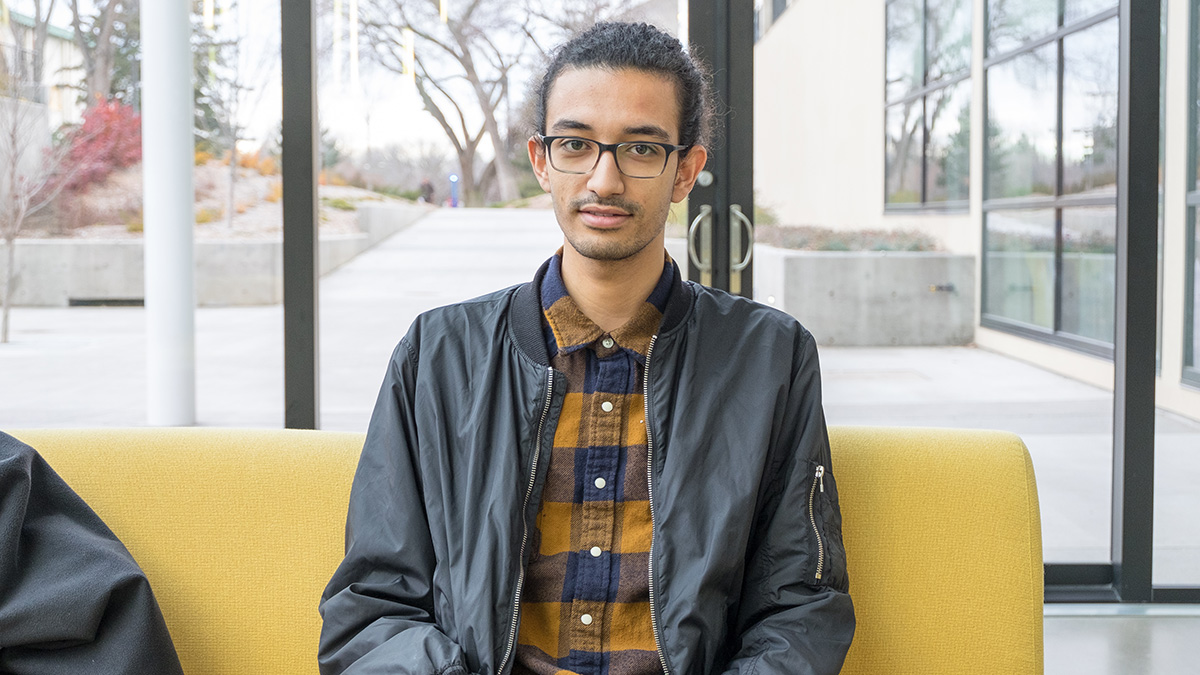Lives of International Students: Akrem Hamami — Tunisia
 Eric Lillow
Eric Lillow The following is part of a series detailing the experiences of international students at the University of Alberta. Given that these students face separation from family, paying more than $20,000 in tuition per year, and uncertainty when it comes to rising tuition costs, we are sitting down with some of these individuals to talk about their experiences at the university.
Third-year education student Akrem Hamami thought he was going to become a solar panel engineer in Tunisia.
But in 2013, the third year of his renewable energies engineering program, he had to come to Canada. It wasn’t ideal to leave family and friends behind while only being one year away from graduating, but he said he needed to be safe.
Hamami says Tunisia is considered “safe” in refugee-accepting countries. The secular Islamic republic has about 11 million citizens, and elects its own legislative assembly and president. But the security situation is different for families of those involved in the communist political party — where Hamami’s father is a prominent figure. His father was elected to the Tunisia’s legislative assembly at the start of his degree, but this resulted in death threats, bomb threats, and vandalism to their property.
“With my family situation, my dad being in danger, I could wake up to a message that says my dad was killed, or my older brother was killed,” he said.
When two individuals in the communist party were assassinated in the same year, the death threats against Hamami’s family carried more weight. Hamami had to stay home from school for nearly a year because of security reasons. He applied for visas to Canada and Australia. The Canadian visa arrived first, and four days later, Hamami left his home.
“I miss the culture, the sun,” he said. “I know it may sound stupid but the sun, the heat. Sometimes I tell my brother I really miss the noise, the crowds, the dust … those little things.”
Only three of his courses from Tunisia transferred to the U of A. And since there isn’t a program for renewable energies here, Hamami decided to go into education (his mother’s a teacher, so he figured he’d take the same path). Student culture in Canada is different; he’s noticed that students can chew gum in class, but the people are “colder.”
“In the hallway, I thought it was going to be ‘Hey, how are you,’ like back home,” Hamami said. “If we see someone once or twice in the same classes, we’re basically friends. Here, people will ignore you.”
Hamami says he isn’t rich — but he can be perceived to be since he pays for living costs and more than $2,000 per course with international prices. He was once homeless for a week, and he now works while taking fewer courses. Tunisia doesn’t allow citizens to send money out of the country, and even if it did, Hamami’s family has to use it to help other family members in greater danger due to politics. To cope with the stress, he keeps himself busy with the Campus Saint-Jean faculty association, the African Students’ Association, the Arabic Music Choir, and the campus chapter of the World University Service of Canada.
Read more on international tuition: International undergrad tuition to increase by three per cent in 2017-18, grad programs to increase as well
Despite working a job at Sears last year, Hamami ended up being unable to pay his fall tuition on time despite earning $19,600 in bursaries. He was blocked from registering in the winter — right as his study permit expired. He was unable to renew the permit because he wasn’t in courses. While most students were going over their new syllabi, ignoring Antifreeze posters, and enjoying the pre-midterm phase of school, Hamami was finding a legal and financial way back into school with the help of International Student Services.
“I was kind of illegal, in a way,” he said. “It was like a vicious circle.”
It’s unlikely that Hamami will be able to afford school next year once more. He’s going to apply for bursaries, but after food, rent, and failing a biology class and being denied the ability to re-take it (the advisor told him he should have had more friends in the class to ask for help), he might be facing a similar situation as last year.
“A lot of students in classes come from the same high school and aren’t really inclusive,” he said. “It’s difficult to make friends with them, and I also have to work. The advisor said they couldn’t let me re-take my exam, but I could re-take the course. But I paid $2,000 for a course, and I’m not ready to pay again.”
This year, he’s paying $7,600 for three classes. He hopes it’s worth it. Steady increases to costs and lack or academic support has Hamami wishing he chose Australia three years ago, but he’s now invested too much in his education here to switch. Even though he started off his post-secondary experience hoping to be an engineer, he’s now looking at a future of teaching social studies to Grade 3 students after he graduates in two years.
“I found out recently that in Grade 3, they teach about Tunisia,” he said. “And I’m happy to teach about that, I can’t wait to teach students about my own country.”
Read the previous installment in Lives of International Students: Afsin Ahamed — Bangladesh.





Seriously what kind of advise is that? Sometimes the advisers can be really unprofessional. Great story!